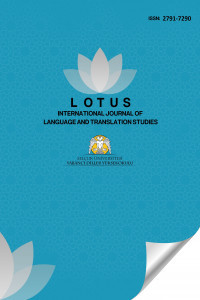21. YÜZYIL BECERİLERİNİN İNGİLİZCE ÖĞRETİMİNE KAVRAMSAL ENTEGRASYONU
Eğitim, bir toplumun gelişiminin temel dayanak noktası olarak ele alınmaktadır. Ayrı bir uzmanlık alanı olarak ortaya çıktığı zamanlardan 19. yüzyıl sonlarına kadar eğitim, içeriğin işlevine odaklanmaktansa içeriğin edinilmesine odaklanmaktaydı. Öğrenciler, sahip oldukları bilgileri iş yaşamlarındaki tecrübelerine adapte etmek zorundaydılar. Bu yüzden, bu durum 21. yüzyıl becerilerinin vurguladığı gerçek hayat tecrübeleriyle okul deneyimleri arasındaki farklılıkları ortaya koydu. Bu doğrultuda; İngiliz Dili Öğretimi alanında, dil becerilerinin öğretiminin detaylandırılması ve bunun devamlı değişen ihtiyaçlar ve teknolojilerle entegrasyonu odak noktası haline geldi. Bilginin inanılmaz bir hızla gelişimi belirli bir alandaki bilginin sınıflandırılmasına neden olur ve bu bilgilerin birbirinden ayırt edilmesi gerekliliğini beraberinde getirir. İngiliz Dili Eğitiminde de bu hıza ayak uydurma adına beceri gelişimi ve materyal seçimi farklı bir boyut kazandı. Buna ek olarak; öğretimin muhtemel sonuçları, dil öğretimi pedagojisi ve doğal olarak öğrenenler tarafından talep edilenleri karşılamak durumundadır. 21.Yüzyıl becerilerinin eğitime çok yönlü bir şekilde uygulanmasında karşılaşılan teori ve uygulamadaki farklılıklar sonucunda bu çalışma; küresel modernleşmenin yeniliklere ve gelişmelere ayak uydurmak için aradığı eleştirel düşünme, dijital okuryazarlık ve bilgi teknolojilerinin özünü oluşturduğu 21. yüzyıl becerileri ve İngiliz Dili Öğretimi arasında doğrudan ilişkiler kurmak amacıyla genel bir perspektif çizmektedir. Bu çalışma, ayrıca İngiliz Dili Öğretimindeki proje bazlı öğrenme ve göreve dayalı öğrenme metodlarının 21. Yüzyıl becerileriyle doğrudan ilişkilerini ele alacak ve Halverson’un 4C’si gibi farklı kavramsal ifadeleri İngiliz Dili Öğretimi potasında eritecektir. Sonunda, çalışma farklı türdeki 21. Yüzyıl becerilerini gözden geçirerek özellikle İngiliz Dili Öğretimi alanında 21. Yüzyıl becerilerinin gerekliliği sonucunu çıkarabilecektir.
Anahtar Kelimeler:
İletişim, İşbirliği, Yaratıcılık, Eleştirel Düşünme, 4C, Dijital Okuryazarlık.
THE CONCEPTUAL INTEGRATION OF 21ST CENTURY SKILLS INTO ELT
Education is presented as a basis of the development of a community. From the time when education emerges as a separate profession to the end of 19th century, it centered upon the acquisition of the content by learners rather than highlighting the function of the content. Learners had to adapt their background knowledge into their experiences at work; therefore, it revealed the distinctions between school experiences and real-life experiences that are elicited by 21st century pedagogies. So, in the field of English Language Teaching (ELT), the elaboration of teaching language skills and its integration with ever-changing needs of language learners and technologies have become primary focus. The growth of information with an unpredictable pace causes to the categorization of information in a specific area and necessitates the distinction of information in that specific area. In ELT, the development of language skills and material selection takes on a unique dimension on behalf of keeping up with that pace. Additionally, the possible outcomes of teaching ought to satisfy what has been demanded by the pedagogy and naturally by learners. As a consequence of the differences between theory and practice that are experienced in the process of sophisticatedly carrying out the 21st century skills in the field of education, the paper draws a conceptual sketch in order to illustrate the direct relation between ELT and the 21st century skills rooted in the info-technology, critical thinking and digital literacy that education looks for in keeping up with the innovations and developments. Besides, it will discuss the direct relations of project-based and task-based learning taking an important place with the 21st century skills, and will melt the different conceptual expressions such as Halverson’s 4Cs in the same pot with ELT. In the end, the paper will be able to conclude the necessity of the 21st century skills especially in the area of ELT thereby reviewing different sorts of the 21st century skills.
Keywords:
Communication, Collaboration, Creativity, Critical Thinking, 4Cs, Digital Literacy,
___
- - Aksela, Maija & Haatainen, Outi. (2019). Project-Based Learnıng (PBL) In Practıse: Actıve Teachers' Vıews Of Its' Advantages And Challenges. Retrieved from https://www.researchgate.net/publication/333868087_PROJECT-BASED_LEARNING_PBL_IN_PRACTISE_ACTIVE_TEACHERS'_VIEWS_OF_ITS'_ADVANTAGES_AND_CHALLENGES
- -Albahlal, F.S. (2019). The Integration of 21th Century Skills into English Language Learning. Journal of Applied Linguistics and Language Research, 6, 144-154. Retrieved from http://www.jallr.com/index.php/JALLR/article/view/1027
- -Black, R. W. (2009). English-Language Learners, Fan Communities, and 21st-Century Skills. Journal of Adolescent & Adult Literacy, 52(8), 688-697. doi:10.1598/jaal.52.8.4
- Chang, S.Y., & Tung, C.A. (2009). Incorporating 21st century skills into business English instruction. Feng Chia Journal of Humanities and Social Sciences, 19, 255-286. Retrieved from http://www.cohss.fcu.edu.tw/wSite/publicfile/Attachment/f1263802406519.pdf
- -Halverson, A. (2018). 21st Century Skills and the "4Cs" in the English Language Classroom. Retrieved from https://scholarsbank.uoregon.edu/xmlui/bitstream/handle/1794/23598/halvorsen_21_century_skills.pdf?sequence=1&isAllowed=y#:~:text=The%204Cs%20we'll%20be,%2C%20critical%20thinking%2C%20and%20creativity.&text=Often%20these%20are%20considered%20to,the%20last%2010%2D15%20years.
- -Lemke, C (2002). EnGauge 21st Century Skills: Digital literacies for a digital age. Washington, DC: Office of educational research and improvement (OERI). Retrieved from https://www.govinfo.gov/content/pkg/ERIC-ED463753/pdf/ERIC-ED463753.pdf
- -Pardede, Parlindungan. (2012). Meeting the 21st Century ELT Challenges: Becoming a Professional Teacher. Retrieved from https://www.researchgate.net/publication/260454199_Meeting_the_21st_Century_ELT_Challenges_Becoming_a_Professional_Teacher ? Plucker, J., Kaufman, J., & Beghetto, R. (2016). The 4Cs research series. P21: Partnership for 21st Century Learning. Retrieved from http://www.p21.org/our-work/4cs-research-series.
- -Trilling, B., & Fadel, C. (2009). 21st century skills: Learning for life in our times. Jossey-Bass/Wiley.
- -Varis, T. (2007). New technologies and innovation in higher education and regional development. Revista de Universidad y Sociedad del Conocimiento, 4(11), 16-24. Retrieved from https://rusc.uoc.edu/rusc/ca/index.php/rusc/article/download/v4n2-varis/309-1226-2-PB.pdf
- FIGURES --Trilling, B., & Fadel, C. (2009). 21st century skills: Learning for life in our times. Jossey-Bass/Wiley. p. 48
- - Halverson, A. (2018). 21st Century Skills and the "4Cs" in the English Language Classroom. (p. 1) Retrieved from https://scholarsbank.uoregon.edu/xmlui/bitstream/handle/1794/23598/halvorsen_21_century_skills.pdf?sequence=1&isAllowed=y#:~:text=The%204Cs%20we'll%20be,%2C%20critical%20thinking%2C%20and%20creativity.&text=Often%20these%20are%20considered%20to,the%20last%2010%2D15%20years.
- Başlangıç: 2021
- Yayıncı: Selçuk Üniversitesi
